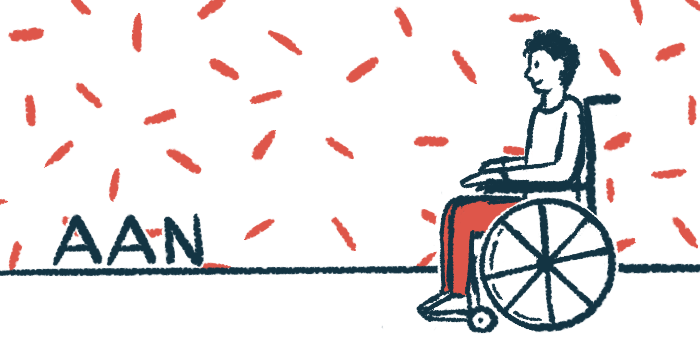AAN 2024: Earlier Ocrevus lowers MS progression risk over 10 years
2-year earlier start 'clearly reduced rate of disability progression': Neurologist
Written by |

Ocrevus (ocrelizumab) continued to prevent disability progression among people with relapsing and progressive forms of multiple sclerosis (MS) over 10 years, according to clinical trial analyses.
The most pronounced benefits were observed in patients who started on the therapy in the controlled part of the trials, compared with those who started it about two to three years later in the extension portions.
“Early treatment clearly reduced the rate of disability progression compared with later treatment,” Stephen Hauser, MD, a neurologist at the University of California, San Francisco, said in a talk at the American Academy of Neurology (AAN) 2024 Annual Meeting, held April 13-18, in Denver, Colorado, and online.
Hauser’s presentation was titled “10 Years of Ocrelizumab Treatment in Multiple Sclerosis: Long-term Efficacy and Safety Clinical Trial Data.”
Ocrevus infusion works to ease MS inflammation by depleting levels of B-cells
Given as an infusion into the bloodstream every six months, Genentech’s Ocrevus works to ease MS inflammation by depleting levels of B-cells, a type of immune cell implicated in the condition.
It’s approved in the U.S. for relapsing forms of MS — including clinically isolated syndrome, relapsing-remitting MS, and active secondary progressive MS — as well as primary progressive MS (PPMS), an indication for which Ocrevus is the only approved disease-modifying therapy.
Approvals for relapsing MS were backed largely by data from the pivotal OPERA 1 (NCT01247324) and OPERA 2 (NCT01412333) studies, where Ocrevus was found superior to Rebif (interferon beta-1a) at lowering disease activity and preventing disability progression.
In PPMS, the ORATORIO Phase 3 trial (NCT01194570) demonstrated that Ocrevus significantly lowered the risk of disability progression and reduced the number of new brain lesions compared with a placebo.
After these studies ended, more than 90% of participants opted to receive long-term Ocrevus in the respective open-label extension studies, which were mainly designed to look at the treatment’s safety and effects on disability accumulation over several years.
Hauser presented 10-year data from patients involved in these extension studies, which included 64% of patients from OPERA and 57% from ORATORIO.
Ocrevus slows disability progression better when taken earlier
Consistent with earlier analyses, results showed patients who had continuously been on Ocrevus since the start of the main trials were at a lower risk of disability progression than those who had started off with Rebif or a placebo, which essentially delayed their Ocrevus start by two to three years years.
Among relapsing MS patients, results showed nearly 8 out of 10 continuously treated patients were free of 48-week confirmed disability progression (CDP) after 10 years. This outcome refers to an increase in Expanded Disability Status Scale (EDSS) scores, compared with scores at the start of the study, that’s confirmed in a follow-up assessment at least 48 weeks later.
Findings from PPMS patients in ORATORIO were similar, although the rate of progression in general was higher in this patient group. Particularly, more than one in three people who were continuously on Ocrevus from the start of the randomized trial were progression-free at 10 years.
The scientist noted CDP rates also declined in patients who had a delayed start to treatment, but “there was no catch-up” compared to patients who started treatment sooner.
Analyzing EDSS data another way, Hauser said that among relapsing MS patients continuously on Ocrevus, the yearly CDP event rate was 0.029. “This means that for every 100 patients, each year three will have a CDP event,” he said.
According to that data, patients would thus be expected to be progression-free for the next 34.5 years after the last progression event — a 9.5-year delay in disease progression compared with patients who started on Ocrevus two years later.
In PPMS patients, annualized CDP rates amounted to about 12 people out of 100 having a CDP event each year. Relative to their delayed-start counterparts, this would slow progression by 1.6 years (8.3 vs. 6.7 years for the placebo group).
PPMS patients on Ocrevus longer at lower risk of needing wheelchair
Moreover, 80.4% of PPMS patients always on Ocrevus avoided the need for a wheelchair after 10 years (EDSS score of 7), and these patients were found to be at a 30% lower risk of reaching that disability milestone compared to the later-start group.
In the OPERA studies, 92.1% of continuously treated relapsing MS patients did not require a walking aid after 10 years (EDSS score of 6), which was linked to a 43% lower risk of reaching this stage of disability compared to patients who had first received Rebif.
Relapse rates continued to fall for OPERA participants, reaching 0.016 after 10 years in the continuously treated group — “that’s one relapse about every 62 years,” Hauser said. MRI disease activity was also “essentially completely suppressed” after 10 years of treatment, the scientist said.
The safety profile of Ocrevus was consistent over the 10-year period, and rates of serious infections — a known consequence of B-cell depleting therapies like Ocrevus — did not increase over time.
Note: The Multiple Sclerosis News Today team is providing coverage of the American Academy of Neurology (AAN) 2024 Annual Meeting April 13-18. Go here to see the latest stories from the conference.





